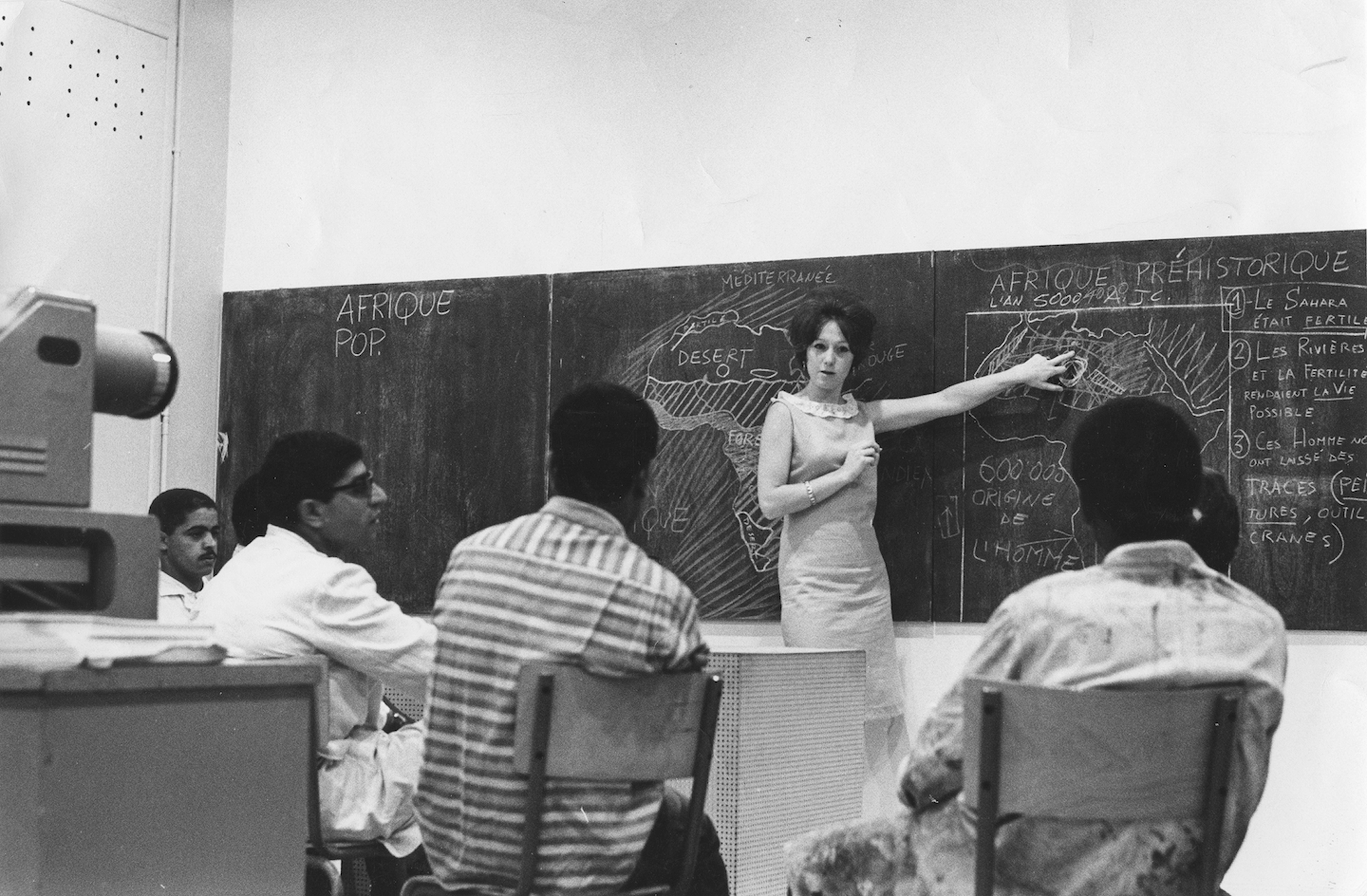
Casablanca Art School, 1965
First Art History course dedicated to Africa by art historian and anthropologist Toni Maraini
L’Ecole des Beaux-Arts de Casablanca, 1965
Image Courtesy Toni Maraini Archive
Copyright © Mohamed Melehi
search


First Art History course dedicated to Africa by art historian and anthropologist Toni Maraini
L’Ecole des Beaux-Arts de Casablanca, 1965
Image Courtesy Toni Maraini Archive
Copyright © Mohamed Melehi
KW Institute for Contemporary Art and Sharjah Art Foundation, in collaboration with Goethe-Institut Marokko, ThinkArt and Zamân Books & Curating have initiated the School of Casablanca, a collaborative project that takes as its starting point the legacy of the Casablanca Art School and its innovative pedagogical methods and exhibition strategies in 1960s Morocco. Launched in 2020, the initiative will continue through 2024.
The School of Casablanca project highlights a pivotal moment in Moroccan art history that had implications for the wider region. After Moroccan independence in 1956, a new civic awareness emerged and impacted artists and intellectuals seeking to reconsider their social function and visibility in the public sphere. Through this process, the artist became the producer of a social and cultural project, in which art was expected to become a space of shared knowledge and experience. The Casablanca Art School was a seminal forum for the development of these ideas and related practices. Drawing on and interpreting the Bauhaus Manifesto, the school engaged models of rethinking the relationship between arts, crafts, design and architecture within a local context.
Recommencing this engagement after the centennial of the Bauhaus, this new collaborative initiative seeks to further the legacy of the Casablanca Art School in contemporary thought, which is important not only within a Moroccan context, but also in relation to critical reflection on the traditions of Western methodology and self-perception.
Through a diverse range of activities, the School of Casablanca revisits and renews the radicality of ideas and actions of the group of individuals who shaped the original school at its peak (1964–1969), and draws upon the spirit of experimentation, discourse, self-organisation and community building embodied by the famous Moroccan cultural magazine of the time, Souffles. Iconic and avant-garde, the cultural review was founded in 1966 by Abdellatif Laâbi, Mostafa Nissabouri and Mohammed Khaîr-Eddine, and collaborated extensively with the Casablanca Art School. Banned by the authorities in 1972, the magazine was an important focal point for Moroccan and international artists, poets, painters, filmmakers, thespians, intellectuals and cultural figures.
The School of Casablanca is curated by Hoor Al Qasimi, Director, Sharjah Art Foundation; Krist Gruijthuijsen, Director, KW Institute for Contemporary Art, Berlin; Salma Lahlou, Independent Curator and Founder, ThinkArt, Casablanca; Inka Gressel, Director, ifa-Galerie, Berlin and Alya Sebti, Director, ifa-Galerie, Berlin (parental leave).
This initiative is in keeping with Sharjah Art Foundation’s longstanding involvement in institutional partnerships, public programming, exhibitions and international projects over the years that support art education, professional development, art practice and the production and sharing of knowledge.
The School of Casablanca includes research residencies, public programmes, a digital archive and a touring exhibition of new works created by the residents as well as an exhibition of historical works by the artists who were originally associated with the Casablanca Art School.
The residency programme invites six participants to conduct research and field work in the city of Casablanca (September 2020–September 2022). The residencies will provide a local context for experimental practice and focused research on the history of the Casablanca Art School from a contemporary perspective, and will allow participants to explore a range of important questions such as, what was achieved by the Casablanca Art School in terms of the development of innovative pedagogical, artistic and exhibition practices? What conclusions can be drawn from the school’s legacy? How and what can we build using this knowledge and moving beyond it? And how can the School of Casablanca project contribute to the development of new artistic practices and the exchange and production of knowledge?
The School of Casablanca will offer public programmes and activities for the local community of Casablanca and beyond, and will provide a new context for learning and engagement with the ideas of the original Casablanca Art School. They will also create an environment for experimenting with new ways of thinking about archive, public space, art and design, and their social function today as well as the development of new practices and tools for artists.
The project will include the digital archiving of the Casablanca Art School (C.A.S.A.– Casablanca Art School Archives), which is managed by Zamân Books & Curating. The archive will form the basis of a wider online platform, which will host a collection of various texts and bodies of work from the Global South, starting with CASA, and provide a comprehensive digital resource for information about modernist and avant-garde histories and trends from the Global South. It will be accessible to everyone around the world with the required credentials.